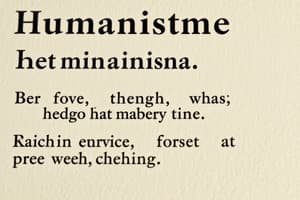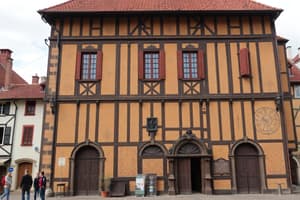Podcast
Questions and Answers
Which of the following terms refers to a ruler with complete authority over the government and the lives of the people?
Which of the following terms refers to a ruler with complete authority over the government and the lives of the people?
- Absolute Monarch (correct)
- Constitutional Monarchy
- Limited Monarchy
- Oligarchy
Humanism emphasizes the study of classical texts and focuses on human potential.
Humanism emphasizes the study of classical texts and focuses on human potential.
True (A)
What is an Indulgence in the context of the Catholic Church?
What is an Indulgence in the context of the Catholic Church?
A practice where people could purchase a remission of sins for themselves or loved ones.
___ means to sail completely around the world.
___ means to sail completely around the world.
What is the concept where rival nations maintain military and economic strength to prevent any one country from dominating?
What is the concept where rival nations maintain military and economic strength to prevent any one country from dominating?
Match the following terms with their definitions:
Match the following terms with their definitions:
A Limited Monarchy has no restrictions on the monarch's power.
A Limited Monarchy has no restrictions on the monarch's power.
What does Heliocentric refer to?
What does Heliocentric refer to?
What did Thomas Hobbes advocate for during the Enlightenment?
What did Thomas Hobbes advocate for during the Enlightenment?
John Locke believed that governments should protect the natural rights of citizens.
John Locke believed that governments should protect the natural rights of citizens.
What was the primary focus of Voltaire's contributions to the Enlightenment?
What was the primary focus of Voltaire's contributions to the Enlightenment?
The economic philosophy promoted by Adam Smith is known as _____ economics.
The economic philosophy promoted by Adam Smith is known as _____ economics.
Match the Enlightenment thinker with their goal or belief:
Match the Enlightenment thinker with their goal or belief:
What was a significant outcome of the American Revolutionary War?
What was a significant outcome of the American Revolutionary War?
Enlightened Despots adopted Enlightenment reforms in response to challenges from absolute monarchy.
Enlightened Despots adopted Enlightenment reforms in response to challenges from absolute monarchy.
What document asserted natural rights and justified rebellion against Britain?
What document asserted natural rights and justified rebellion against Britain?
The forming of the United Kingdom of Great Britain in 1707 included England, Scotland, and _____ .
The forming of the United Kingdom of Great Britain in 1707 included England, Scotland, and _____ .
What impact did the American Revolution have globally?
What impact did the American Revolution have globally?
What role did patrons play during the Renaissance?
What role did patrons play during the Renaissance?
What is a fundamental principle of Humanism?
What is a fundamental principle of Humanism?
Which concept is central to Calvinist theology?
Which concept is central to Calvinist theology?
What does the term 'Inflation' refer to in economic contexts?
What does the term 'Inflation' refer to in economic contexts?
What distinguishes a Constitutional Monarchy from an Absolute Monarchy?
What distinguishes a Constitutional Monarchy from an Absolute Monarchy?
What does the concept of 'Balance of Power' aim to achieve?
What does the concept of 'Balance of Power' aim to achieve?
What defines an Oligarchy?
What defines an Oligarchy?
What does it mean to 'Circumnavigate'?
What does it mean to 'Circumnavigate'?
What was the primary aim of the Enlightenment period?
What was the primary aim of the Enlightenment period?
Which of the following thinkers is associated with the concept of the social contract?
Which of the following thinkers is associated with the concept of the social contract?
How did Montesquieu contribute to the political ideas during the Enlightenment?
How did Montesquieu contribute to the political ideas during the Enlightenment?
What was a significant reason for colonial discontent leading to the American Revolution?
What was a significant reason for colonial discontent leading to the American Revolution?
Mary Wollstonecraft is best known for advocating which of the following?
Mary Wollstonecraft is best known for advocating which of the following?
What role did salons play in the spread of Enlightenment ideas?
What role did salons play in the spread of Enlightenment ideas?
What document, authored by Thomas Jefferson, justified rebellion against Britain?
What document, authored by Thomas Jefferson, justified rebellion against Britain?
What is a key principle of Adam Smith's economic philosophy?
What is a key principle of Adam Smith's economic philosophy?
What was the global impact of the American Revolution?
What was the global impact of the American Revolution?
What change occurred in Britain during the mid-18th century?
What change occurred in Britain during the mid-18th century?
Flashcards
What is a Patron?
What is a Patron?
A wealthy person or institution supporting artists, writers, and scholars during the Renaissance.
What is Humanism?
What is Humanism?
An intellectual movement focused on classical Greek and Roman texts, emphasizing human potential and individual achievement.
What is an Indulgence?
What is an Indulgence?
A practice in the Catholic Church where people could buy forgiveness for sins, criticized by Martin Luther.
What is Predestination?
What is Predestination?
Signup and view all the flashcards
What does Heliocentric mean?
What does Heliocentric mean?
Signup and view all the flashcards
What does it mean to Circumnavigate?
What does it mean to Circumnavigate?
Signup and view all the flashcards
What is an Absolute Monarch?
What is an Absolute Monarch?
Signup and view all the flashcards
What is Divine Right?
What is Divine Right?
Signup and view all the flashcards
What was the Enlightenment?
What was the Enlightenment?
Signup and view all the flashcards
Who was Thomas Hobbes?
Who was Thomas Hobbes?
Signup and view all the flashcards
What were John Locke's main beliefs?
What were John Locke's main beliefs?
Signup and view all the flashcards
What did Montesquieu propose?
What did Montesquieu propose?
Signup and view all the flashcards
What economic philosophy did Adam Smith promote?
What economic philosophy did Adam Smith promote?
Signup and view all the flashcards
How did Enlightenment ideas spread?
How did Enlightenment ideas spread?
Signup and view all the flashcards
Who were the Enlightened Despots?
Who were the Enlightened Despots?
Signup and view all the flashcards
How did Britain rise in power during the mid-18th century?
How did Britain rise in power during the mid-18th century?
Signup and view all the flashcards
What were the main causes of the American Revolution?
What were the main causes of the American Revolution?
Signup and view all the flashcards
What did the U.S. Constitution establish?
What did the U.S. Constitution establish?
Signup and view all the flashcards
What is the balance of power?
What is the balance of power?
Signup and view all the flashcards
What is a constitutional monarchy?
What is a constitutional monarchy?
Signup and view all the flashcards
Who was Voltaire?
Who was Voltaire?
Signup and view all the flashcards
What did Jean-Jacques Rousseau advocate for?
What did Jean-Jacques Rousseau advocate for?
Signup and view all the flashcards
What were Mary Wollstonecraft's key ideas?
What were Mary Wollstonecraft's key ideas?
Signup and view all the flashcards
Study Notes
Renaissance and Reformation Terms
- Patron: A wealthy individual, family, or institution supporting Renaissance artists, writers, and scholars, like the Medici family.
- Humanism: A movement emphasizing classical Greek and Roman texts, human potential, individual achievement, and secular concerns.
- Indulgence: A Catholic practice allowing purchase of sin remission; criticized by Martin Luther.
- Predestination: The belief, core to Calvinism, that God predetermines salvation or damnation.
Scientific Revolution and Exploration Terms
- Heliocentric: The sun-centered universe theory, proposed by Copernicus, contradicting the geocentric model.
- Circumnavigate: To sail completely around the world; Magellan's expedition was the first to do so.
- Inflation: A general increase in prices and decrease in money value, often from gold/silver influx, impacting Europe during the Age of Exploration.
- Encomienda: A Spanish colonial system allowing settlers to claim Native American labor or tribute for protection and conversion.
Absolutism and Government Terms
- Absolute Monarch: A ruler with complete authority over government and people's lives, often claiming divine right, like Louis XIV.
- Divine Right: The belief that a monarch's authority comes directly from God, justifying absolute power.
- Balance of Power: A political system where rival nations maintain similar strengths, avoiding domination by one.
- Constitutional Monarchy: A government limiting a monarch's power through a constitution or laws, like England after the Glorious Revolution.
- Limited Monarchy: A system where a monarch's power is restricted by law or a governing body, like Parliament in England.
- Oligarchy: A government ruled by a small group of powerful individuals, usually from the elite.
The Enlightenment and the American Revolution (1700–1800)
Section 1: Philosophy in the Age of Reason
- Enlightenment: A period emphasizing reason, individualism, and challenging traditional authority, to improve governance and quality of life through natural laws.
- Thomas Hobbes: An Enlightenment thinker advocating for a strong government to control chaos, supporting absolutism, as seen in Leviathan.
- John Locke: An Enlightenment thinker believing in natural rights (life, liberty, property), emphasizing government protection of these rights, influencing modern democracy.
- Montesquieu: Proposed the separation of government powers (legislative, executive, judicial) to prevent tyranny, outlined in The Spirit of the Laws.
- Voltaire: Advocated for freedom of speech and religion, criticizing intolerance and corruption.
- Jean-Jacques Rousseau: Advocated for the social contract, where governments are based on the "general will" of the people, discussed in The Social Contract.
- Mary Wollstonecraft: Argued for women's rights and education, prominently in A Vindication of the Rights of Woman.
- Adam Smith: Promoted free-market economics and the "invisible hand" in The Wealth of Nations.
Section 2: Enlightenment Ideas Spread
- Enlightenment Idea Dissemination: Ideas spread through salons, the printing press, and art/literature reflecting Enlightenment themes.
- Enlightened Despots: Monarchs adopting Enlightenment ideas to institute reforms, like Frederick the Great (Prussia), Catherine the Great (Russia), and Joseph II (Austria).
Section 3: Britain at Mid-Century
- Britain's Rise: Britain's power increased through trade and colonization, leading to the United Kingdom's formation in 1707 (England, Scotland, and Wales).
- Colonial American Economy: American colonies economically flourished but were limited by British policies like mercantilism and taxes.
- British Political Changes: Britain transitioned to a constitutional monarchy, with Parliament gaining greater power.
Section 4: Birth of the American Republic
- American Revolution Causes: Colonial grievances against British policies (taxation without representation) and Enlightenment ideas fueled calls for independence and democracy.
- Declaration of Independence: A 1776 document authored by Jefferson asserting natural rights and justifying rebellion against Britain.
- Revolutionary War Outcome: Colonies, with French assistance, defeated British forces.
- U.S. Constitution: Established a federal system with checks and balances, influenced by Enlightenment thinkers like Montesquieu, including a Bill of Rights ensuring freedoms like speech and religion.
- American Revolution's Global Impact: Inspired future democratic movements in France and Latin America.
Key Themes and Takeaways
- Enlightenment Reason: Enlightenment thinkers believed reason could solve social and political problems.
- Challenge to Authority: Enlightenment ideas challenged traditional institutions, like absolute monarchies and the Church.
- Modern Democracy: Modern democratic principles are rooted in Enlightenment thought.
- Global Impact: The American Revolution spread ideas of liberty and self-governance globally.
Studying That Suits You
Use AI to generate personalized quizzes and flashcards to suit your learning preferences.




